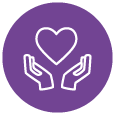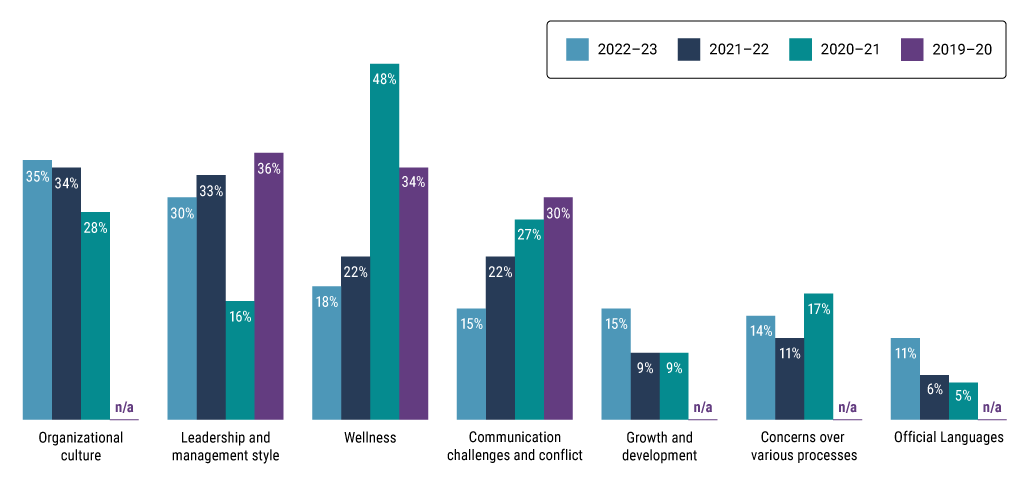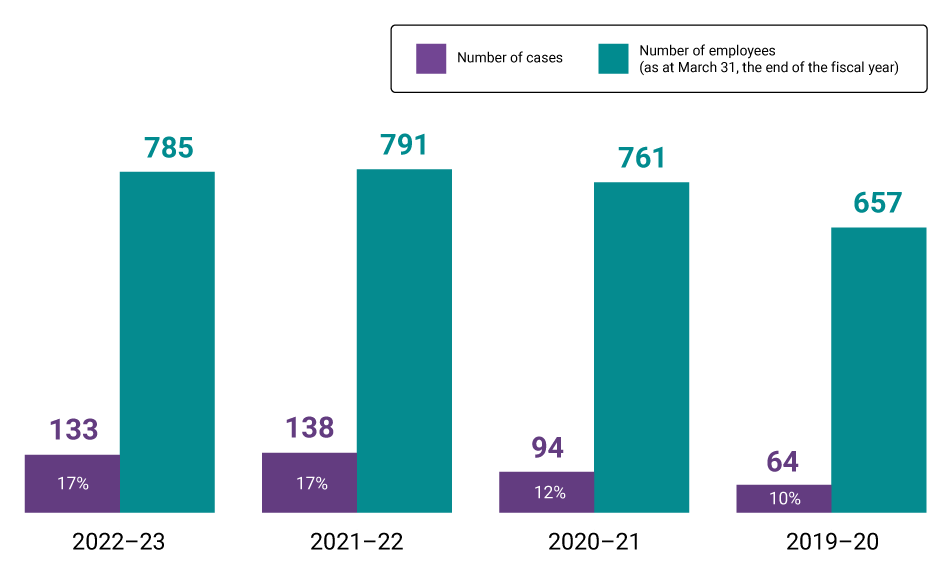Ombuds Annual Report: The Gift of Listening
September 2022 to August 2023
Message from the Ombuds—A Year in the Life of the Office of the Auditor General of CanadaOAG
This past year saw OAG employees and managers continue to navigate a range of changes affecting their work life at the OAG. The strategic plan and new governance structures have been launched, the transformation journey is underway, and a new model of hybrid work has been introduced that will continue to evolve as renovations to our Ottawa office progress. A talent management framework is also being rolled out including Leadership Blueprint training and a renewed focus on employee development through structured performance management.
As the OAG Let’s Talk Change initiative has emphasized, open communication is key to successful change. Leaders need to create mechanisms and opportunities for ongoing dialogue at every stage of a change initiative, to listen closely, and be prepared to make adjustments if needed. Indeed, many feedback mechanisms have been provided these past few years, flagging important considerations for the organization.
| Revitalization focus groups and interviews— Top 5 priorities (September 2022) |
2022–23 Public Service Employee Survey— OAG results |
|---|---|
|
A downward trend from the 2020 results across each survey theme:
|
It feels like an important moment, as managers are being asked to engage their teams in conversations about revitalization priorities, what has been done so far, and what gaps exist. It is in this context that I chose the theme of this year’s report: the gift of listening. If we can all listen with the goal of understanding the other person’s point of view, instead of formulating our own response, we build trust and make people feel heard. Obviously, becoming better listeners does not mean we will agree on everything, but it increases our chances of communicating with respect and perhaps even finding common ground in our differences.
In an organizational context, this listening goes both ways. Leaders and managers can foster a culture of listening to allow for a range of perspectives to be heard and considered. Team members need to listen closely as well and invest themselves in understanding the organization’s direction and priorities to figure out how best they can contribute.
As always, I welcome your feedback and input. If you are looking for support in dealing with a challenging situation, do not hesitate to get in touch. I’m here to listen.
Ombuds’s role at the OAG
- Provide a safe environment where employees can discuss and resolve work‑related issues in confidence.
- Monitor the pulse of the organization, share information, and provide upward feedback to encourage a healthy environment.
What I Heard This Year …
From September 2022 to August 2023, employees and managers discussed 133 different cases with me. Because the Ombuds service is informal and confidential, I do not maintain formal records, but I keep track of the topics raised so that I can share information about the kinds of issues that are affecting people in the workplace. For each situation, I take note of 1 or 2 topics and the services sought, depending on the complexity of the case; hence the percentages will add up to more than 100%. The following are the top categories of topics raised this year and the number and percentage of cases in which each topic was raised.
Topics raised
 Organizational culture (raised in 47, or 35%, of total cases)
Organizational culture (raised in 47, or 35%, of total cases)
- Lack of coherence between what is described as the desired culture (diverse, inclusive, respectful, and people-oriented) and how some people experience it (competitive, hierarchical, perfectionist, and product-focussed).
- Many people at the OAG place a lot of importance on the Care and Connect pillars. In exit interviews, most departing employees said they enjoyed their teams and appreciated the care demonstrated by their colleagues and supervisors. Other employees are frustrated by what feels like a lack of caring in their work situations, and many mentioned that it makes it worse when the organization says it cares and behaves as if it doesn’t.
- I heard the work climate described as lonely and transactional in some cases. Others talked about “pressure cooker” situations where timelines are impossible to meet without sacrificing one’s personal life and mental health.
- Some people perceive that decisions are made at senior levels without regard to the impact on employees, or they have difficulty understanding the rationale provided for the decision (for example, the criteria established to be eligible for full‑time telework or the discontinuation of the Audit Professionals Employee Relations Committee).
- Some people expressed frustration with the OAG’s lack of innovation and described our technology and processes as out of date, which they attributed to a culture of risk aversion and overly complicated decision-making processes.
- Some people feel the office is pursuing too many priorities at the same time without proper attention to implementation or without integrating various related initiatives.
- Diversity and inclusion
- Some employees expressed skepticism about the OAG’s commitment to accessibility, pointing to events and consultation sessions that were not as inclusive as they would have expected.
- I heard from some employees who support the goal of a diverse and inclusive workforce but worry that an emphasis on representation is having the unintended consequence of making people from employment equity groups worry about perceptions of tokenism, even though they are evaluated on the basis of merit like all employees.
When we consider the Public Service Employee Survey results for the OAG by demographic characteristics, we see that people from equity seeking groups can have a different experience of the workplace than the overall population. For example,
- Fifty-three percent of racialized employees feel that the OAG does a good job of supporting employees’ career development compared with 68% for non‑racialized employees.
- Twenty-five percent of persons with a disability report having been the victim of harassment on the job in the past 12 months compared with 5% for their colleagues.
 Leadership and management style (raised in 40, or 30%, of total cases)
Leadership and management style (raised in 40, or 30%, of total cases)
- Similar to last year, micromanagement was the most frequently cited concern in this topic category, but I also heard about the negative effects of under-management. The following are some examples of observations shared with me.
| Micromanagement | Under-management (particularly lack of direction and decision making) |
|---|---|
|
My manager is too present in the team I supervise, and this undermines me. I estimate my manager taps about 25% of my potential because of their need to control my every move. My manager is only interested in accomplishing tasks from a to‑do list and does not consider the bigger picture of how our work impacts others. I am backsliding instead of growing professionally. Management needs to learn to trust employees and delegate responsibility. My manager imposes additional burdens on the work we do because of their rigid working style preferences. My leader’s level of stress and overload create an unhealthy pressure—their hypervigilance keeps everyone on edge. |
There are many challenges in how the work is being organized … lack of planning and resource allocation, slow decision making, and poor communication between levels of management. We go from crisis audit to crisis audit. People are burning out. The OAG’s new vision of pursuing relevance and demonstrating outcomes has not been followed up with concrete guidance on how to incorporate these priorities into our work. Our approach to information technology needs clear direction. We need timely and informed action on priority areas. Senior management does not set lower management up for success by providing clear rationale for decisions. |
- The next most frequent concern was communication styles, particularly in how feedback is provided. Some people described the tone of leaders and managers as adversarial, abrasive, blaming, and destructive instead of constructive. A lack of listening was also frequently cited.
 Wellness (raised in 24, or 19%, of total cases)
Wellness (raised in 24, or 19%, of total cases)
- Return to the office and duty to accommodate
- Some employees were disappointed with the decision to require 37.5 hours per month on site. Many expressed that virtual work was effective for themselves and their teams and that they did not understand the rationale for moving to a mandatory hybrid model.
- Some employees with invisible disabilities found the return to office challenging. They had adapted well to virtual work and were reluctant to request accommodations because of the fear of stigma. Some neurodivergent employees expressed that adapting to change while managing a heavy workload has been particularly challenging.
- For some, the return to office felt premature and created anxiety about the ongoing risks of the pandemic.
- Heavy workload and unrealistic timelines. Some people found that expectations were unrealistic and contributed to stress, feelings of failure, and sometimes burnout.
- Mental health concerns. I heard from employees struggling with their own psychological health, whether related to personal or work‑related circumstances, and from people wondering how to support a colleague who appeared to be struggling.
 Communication challenges and conflict (raised in 20, or 15%, of total cases)
Communication challenges and conflict (raised in 20, or 15%, of total cases)
- Of the situations people discussed with me under this topic category,
- 11 were related to supervisor–employee dynamics
- 4 touched on relationships among colleagues
- 5 were related to feeling in conflict with the organization itself
- Although each situation is different, a theme that arises frequently is feedback. Despite positive intentions, feedback conversations can escalate. There are a lot of great tools and resources available to help us prepare for both giving and receiving feedback. If we take the time to prepare ourselves for potentially difficult conversations, we can sometimes bring about more constructive outcomes.
 Growth and development (raised in 20, or 15%, of total cases)
Growth and development (raised in 20, or 15%, of total cases)
- In this year’s exit interviews, the most cited reasons for leaving the office were to seek new and different challenges or opportunities and to pursue career growth and advancement that were not available at the OAG. In many cases, employees saw their own departure as a natural and necessary step in their career, while others were disappointed there was no way for them to keep growing and advancing at the OAG.
- Some people expressed that they felt underused in their roles and worried about losing their competitive edge in their field of choice, whether in audit or service areas.
- Some Audit Professional employees describe their career pathway as unclear. Others find the promotional process overly rigid.
- Some Audit Services Group employees find their teams too small to provide adequate room to grow and advance.
 Concerns over various processes (raised in 18, or 14%, of total cases)
Concerns over various processes (raised in 18, or 14%, of total cases)
- Sometimes people get in touch with me for a sounding board on questions related to staffing processes, compensation and classification decisions, or procedures and guidelines touching on topics like travel, telework, and accommodations. As a non‑expert, I listen to their concerns and refer them to the available information or contact person if appropriate. If a process or procedure is raised by multiple people, or appears to be creating unintended negative consequences or perceptions, and the information can be shared without identifying a particular employee, I may reach out to the person responsible for the process or practice to make them aware.
 Official languages (raised in 14, or 11%, of total cases)
Official languages (raised in 14, or 11%, of total cases)
- I heard from some employees about their concern that attention to French in the workplace is declining and that this makes them feel less valued. Some Francophones said that constantly working in their second language causes mental strain and fatigue, and some Audit Professional employees mentioned that they would like to see more audit mandates conducted in French.
- Employees also shared their struggles to receive internal services or correspondence in their language of choice. The following are some examples:
- consultation sessions (internal or consultant‑led) being held in English only
- requesting a service in French and receiving a reply in English
- supplementary learning material provided in English only at a bilingual training session
- working tools (such as online forms or computer software) not fully bilingual, and new work tools being piloted in English only
- Some English-speaking employees, particularly if they did not have access to a bilingual environment or education, expressed frustration that language requirements impede career advancement.
- Some employees also found it difficult to make language training a priority when the organizational culture emphasizes that the work comes first.
Main topics by yearNote *
Following are the main topics for 2022–23 and the percentage of cases in which they were raised for the last 3 fiscal years.Note **

Text version
| Topic | 2022–23 | 2021–22 | 2020–21 | 2019–20 |
|---|---|---|---|---|
| Organizational culture | 35% | 34% | 28% | Not available |
| Leadership and management style | 30% | 33% | 16% | 36% |
| Wellness | 18% | 22% | 48% | 34% |
| Communication challenges and conflict | 15% | 22% | 27% | 30% |
| Growth and development | 15% | 9% | 9% | Not available |
| Concerns over process | 14% | 11% | 17% | Not available |
| Official Languages | 11% | 6% | 5% | Not available |
Number of cases in proportion to the number of OAG employees

Text version
| 2022–23 | 2021–22 | 2020–21 | 2019–20 | |
|---|---|---|---|---|
| Number of cases | 133 | 138 | 94 | 64 |
| Number of employees (as at March 31, the end of the fiscal year) | 785 | 791 | 761 | 657 |
| Percentage | 17% | 17% | 12% | 10% |
Other topics raised this year, in order of frequency
- Workload management
- Values and ethics
- Harassment and incivility
- Performance management
- Pay and benefits
Services
People contact the Ombuds for various reasons—very often, it’s the opportunity to be heard by a neutral party. In other situations, people are looking for help about what resources or options may be available to them, or they may request that their issues be flagged confidentially to other parties in the hopes of resolving a systemic irritant.
The top 3 services provided this year were the following:
- I provided visitors with a sounding board and an opportunity to be heard in 127, or 95%, of situations.
- I conducted an exit interview and shared results with Human Resources with the visitor’s permission in 41, or 31%, of cases.
- I helped identify avenues and options for resolution, often including some the visitor did not previously know about, in 25, or 19%, of situations.
Other services provided
- When permission was given to me by the visitor, I shared feedback with management or other stakeholders while protecting the visitor’s identity.
- I referred a visitor to another resource, internal or external (when they were not already aware of or in touch with this resource).
- I provided resources or tools, such as tips on wellness or how to have a difficult conversation.
- I helped a visitor to use a direct approach, such as coaching, role‑playing, or scripting.
- I raised a specific case with management or stakeholders with the visitor’s permission.
- I obtained another party’s perspective on the visitor’s behalf.
- I obtained information from other sources on the visitor’s behalf.
- I facilitated an informal discussion between parties.
In Closing …
In this report, I tried to do justice to the issues that people shared with me throughout the year, in the hopes that sharing these concerns might contribute to our ongoing growth and improvement as an organization. As Ombuds, acknowledging the privilege of my position and my personal background, I strive to provide a service that is accessible and trustworthy and to do my part to foster a workplace where we all feel we belong. I believe that listening to one another is a great place to start.
There are many resources available to support you, such as the union for Audit Services Group employees, the informal conflict-management services, the designated recipient for complaints of workplace harassment and violence, the Employee Assistance Program, your manager, your colleagues, and me. I hope everyone will feel safe reaching out for the support they need.
Janet Campbell, Ombuds
Contacting the Ombuds is easy
- Reach out to me by Microsoft Teams, email, or phone.